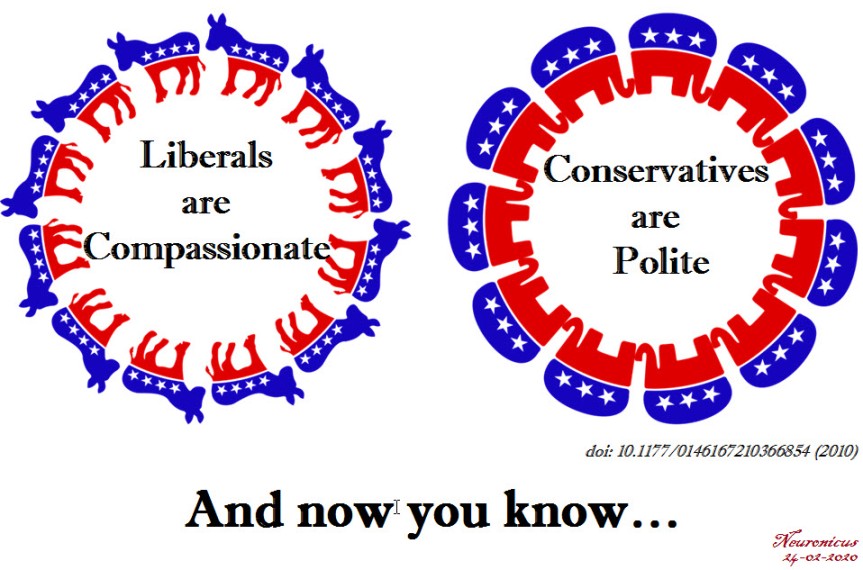After reading these two words, my first thought was that you can have a whole range of people, some compassionate but not polite (ahem, here, I hope), polite but not compassionate (we all know somebody like that, usually a family member or coworker), or compassionate and polite (I wish I was one of those) or neither (some Twitter and Facebook comments and profiles come to mind…).
It turns out that it is not the case. As in: usually, people are either one or another. Of course there are exceptions, but the majority of people that seem to score high on one trait, they tend to score low on the other.
Hirsh et al. (2010) gave a few questionnaires to over 600 mostly White Canadians of varying ages. The questionnaires measured personality, morality, and political preferences.
After regression analyses followed by factor analyses, which are statistical tools fancier than your run-of-the-mill correlation, the authors found out that the polite people tend to be politically conservatives, affirming support for the Canadian or U.S. Republican Parties, whereas the compassionate people more readily identified as liberals, i.e. Democrats.
Previous research has shown that political conservatives value order and traditionalism, in-group loyalty, purity, are resistant to change, and that they readily accept inequality. In contrast, political liberals value fairness, equality, compassion, justice, and are open to change. The findings of this study go well with the previous research because compassion relies on the perception of other’s distress, for which we have a better term called empathy. “Politeness, by contrast, appears to reflect the components of Agreeableness that are more closely linked to norm compliance and traditionalism” (p. 656). So it makes sense that people who are Polite value norm compliance and traditionalism and as such they end up being conservatives whereas people who are Compassionate value empathy and equality more than conformity, so they end up being liberals. Importantly, empathy is a strong predictor for prosocial behavior (see Damon W. & Eisenberg N (Eds.) (2006). Prosocial development, in Handbook of Child Psychology: Social, Emotional, and Personality Development, New York, NY, Wiley Pub.).
I want to stress that this paper was published in 2010, so the research was probably conducted a year or two prior to publication date, just in case you were wondering.

REFERENCE: Hirsh JB, DeYoung CG, Xu X, & Peterson JB. (May 2010, Epub 6 Apr 2010). Compassionate liberals and polite conservatives: associations of agreeableness with political ideology and moral values. Personality & Social Psychology Bulletin, 36(5):655-64. doi: 10.1177/0146167210366854, PMID: 20371797, DOI: 10.1177/0146167210366854. ABSTRACT
By Neuronicus, 24 February 2020



